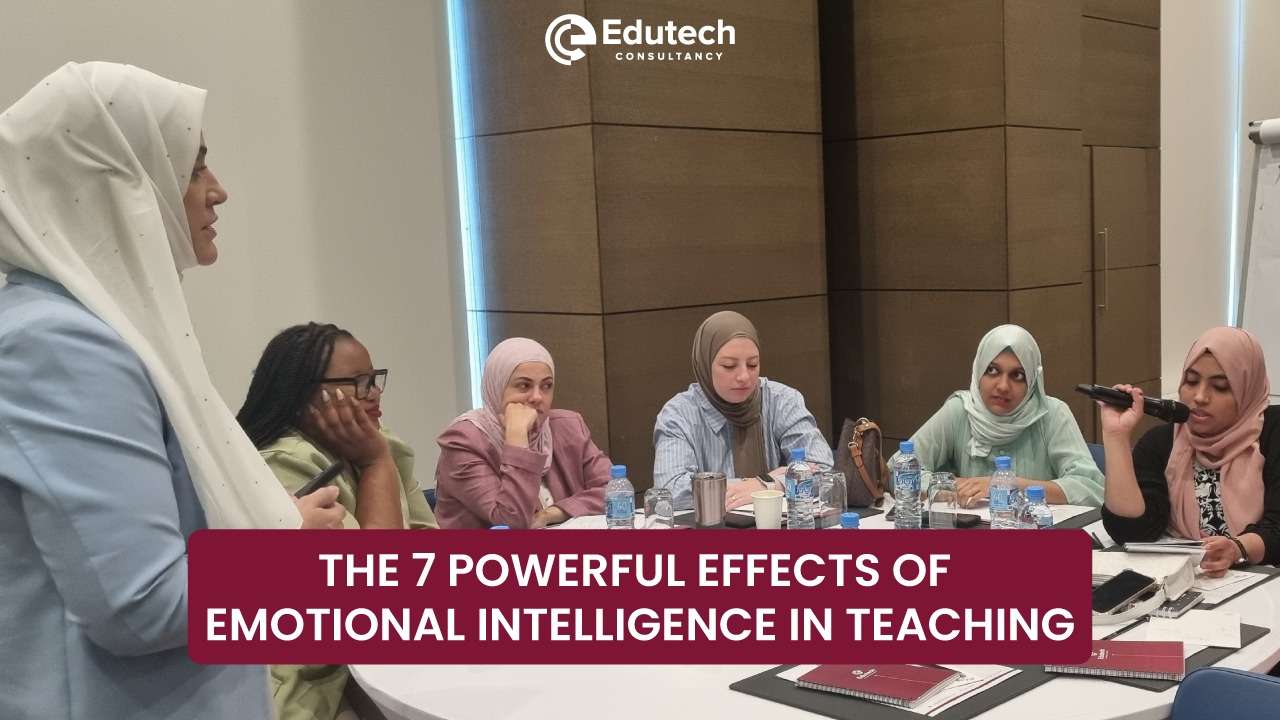Today, we share some powerful effects of Emotional Intelligence in teaching and how it changes classrooms, strengthens teacher-student relationships, and enhances the overall learning experience for everyone involved.
As a teacher, have you ever noted that some days, when you enter your classroom, something looks off the routine? It also happens that the students who are usually vibrant with chatter and energy, feel a little different. As you go through the day, you realize that the regular calm is slipping away. Sometimes, disruptions also take place in the classroom. You may see disagreement on sharing stationery supplies.
Additionally, you come across a student who refuses to participate. And all you feel is frustration bubbling up inside you to figure out how to get through. What does it all mean? Have you ever questioned yourself? Why do you start feeling that the atmosphere in the classroom is so tense and uninviting? Hence, the answer lies in identifying the force at play, Emotional Intelligence—and how it profoundly shapes the dynamics of teaching and learning over time.
What is EI and the everyday Effects of Emotional Intelligence in Teaching?
Emotional Intelligence is an ability and a trait that helps an individual understand, manage, and use emotions effectively in self and others. When we talk about teaching, it’s a vital skill that contours the way educators connect with students and face challenges with composure, creating calm learning spaces for learners.
Five best Practices to see Effects of Emotional Intelligence in Teaching
Developing Emotional Intelligence is not an overnight process; it is intentional practice every day with small steps that will yield significant changes.

Here are some tips on how to reap the effects of Emotional Intelligence in teaching with success.
1. Self-Awareness:
The first step in managing your emotions is to recognize them yourself. Do you ever take a moment out each day to reflect on your emotions? Just ask yourself how you react in intense moments? Why do you react this way? What if you could have some alternative to address these reactions? If not, start doing it today and here. Just ask yourself what you do when you come across moments that disrupt the harmony in the classroom.
2. Be an Active Listener:
Active listening is not about hearing words. It’s about understanding what your students are saying. Maintaining eye contact, acknowledging with a nod, and asking questions about students’ queries shows that you are actively engaged in conversation. Students who are heard simultaneously feel that they can trust you. As a result, this trust creates a positive and respectful classroom environment.
3. Learn to Respond and Not React:
Teaching often brings moments of challenges. The difference that Emotional Intelligence brings is how you handle those events. It is always better to take a moment to think over and then respond to what the event demands. The instant reaction of an outburst or unthoughtful response often leads to unsatisfactory outcomes. Having better emotional control sets an example for students. Responding well helps to address the root cause of issues rather than just the symptoms. Consequently, this approach helps develop a culture of respect and understanding in your classroom.
4. Practice Empathy:
Empathy allows you to step into your students shoes and see things from their perspective. Whenever a student is struggling, never assume things based on their behavior. Rather, Focus on what is causing them to act this way. Using words like, “I understand your problem,” or “It’s difficult for you to get there” will instantly validate their feelings. Empathy alone acts as a strong catalyst to boost stronger connections and creates a safe space where students feel valued and understood. Furthermore, it also helps students learn how to show compassion toward others.
5. Professional Development Opportunity:
Emotional Intelligence is a skill. Teachers can enhance their abilities by participating in workshops, webinars, or active discussions focused on EI. Moreover, professional development events on Emotional Intelligence serve as a wonderful tool for managing emotions better, improving classroom dynamics, and reducing stress. Additionally, they help educators stay updated, motivated, and confident in teaching practices. Investing in personal development also models lifelong learning for students.
Emotional Intelligence is the very first step in building Stronger Connections
Students are largely influenced by how a teacher interacts with them, not just the material delivering knowledge. This only happens when a teacher is aware of one’s own emotions. Furthermore, this trait can enable teachers to respond to students’ needs more effectively.
When a student looks frustrated, instead of pushing them to finish the study tasks, just take a moment to identify and ask, “What’s going on with them and how to help them overcome this phase?
Let’s get through the powerful impact Emotional Intelligence has on teaching.
1. Communication Skills become better:
Teachers who practice strong Emotional Intelligence consequently learn to communicate effectively. This is not just reflected in words but in the tone that speaks. When teachers ensure support and understanding through a calm conversation, students respond better to them naturally. Classrooms become a hub of effective communication.
2. Teachers feel Empathy for Student Needs:
Empathy teaches teachers how to connect with students on a deeper level. This trait helps teachers understand students’ problems and perspectives. When teachers better understand this, they learn to better meet their students’ needs. Empathy ensures teachers care and builds stronger relationships with students.
3. Reduces stress:
Teaching comes with its share of challenges, but with sound Emotional Intelligence, educators manage stress effectively. They better recognize their triggers, and connecting with themselves helps resolve those intense moments with ease. Through effective stress management, Emotional Intelligence keeps the classroom environment a stress-free zone. Harmony, peace, and calm interaction become a usual practice.
4. Academic Success:
Every teacher aspires to academic success. When students feel emotionally supported in the classroom, they are better equipped to succeed academically. Teachers who encourage a growth mindset, such as reassuring students to realize that mistakes are part of learning, reduces anxiety, and motivates students to embrace challenges confidently.
5. Develop Social-Emotional Learning in students:
One of the most powerful effects of Emotional Intelligence in teaching is the ability to integrate Social-Emotional Learning (SEL) into daily classroom practices. Teachers’ profound emotional awareness collectively guides all students in developing their Emotional Intelligence. When students see the skills of empathy, resilience, and emotional regulation in their teachers, they learn to manage stress, improve focus, and regulate their emotions effectively. The impact of SEL goes beyond academics, preparing students to navigate real-world challenges with emotional maturity.
6. Effects of Emotional Intelligence in Teaching: Strong Parent-Teacher Relationships
Emotional Intelligence, through empathy and active listening, enables teachers to understand parents’ perspectives and address concerns constructively. Emotionally intelligent teachers communicate with a clear and compassionate objective. Therefore, a strong parent-teacher relationship, deep-rooted with Emotional Intelligence, ultimately strengthens the connection between home and school. Furthermore, this serves to benefit the child’s overall development.
7. Increased Job Satisfaction:
Emotional Intelligence plays an important role in enhancing teachers’ job satisfaction. Satisfaction with one’s work and duties are the single factors that determine how the individual perceives success. The strong relationships with students, peers, and parents signify a sense of purpose in educators. They feel their work is more fulfilling when they can navigate daily challenges with confidence and composure. This also results in teachers having less stress and burnout with Emotional Intelligence, allowing them to focus on the joy of teaching.
Take Your Emotional Intelligence to the Next Level?
Adorning your teaching with Emotional Intelligence isn’t just about improving moods or enhancing classroom dynamics. It’s a lasting impact that helps you show up the best version of yourself daily. With composure to be empathetic, resilient, and emotionally aware individuals the effects of Emotional Intelligence will serve you for a lifetime. If you want to learn more about creating lasting connections, managing stress effectively, and giving your students the best gift as a compassionate teacher, join Edutech Consultancy’s Personal Development workshop for Teachers on The Power of Emotional Intelligence.

Click here to enroll for the workshop! Learn instant tactics from building emotional resilience to improving communication and adopting empathy, and change how you approach teaching and beyond.


